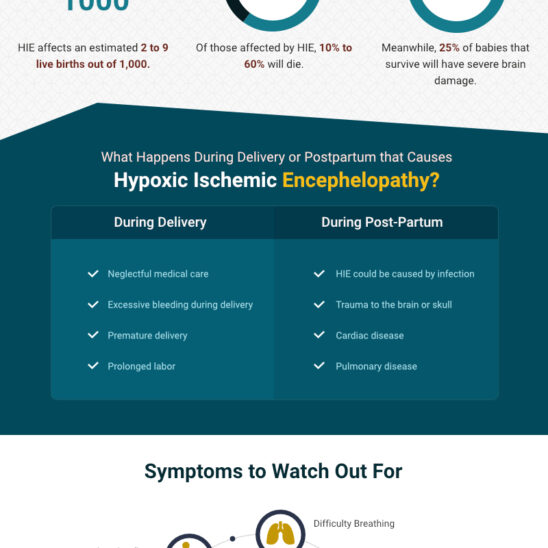Hypoxic-ischemic encephalopathy occurs when an infant does not receive enough oxygen or blood during delivery or the postpartum period. The condition often causes brain damage that results in cognitive and developmental impairments, cerebral palsy or death. The severity of HIE usually cannot be determined until the child reaches the age of three or four years. Infants that suffer from severe complications of HIE could require extensive medical treatment throughout their lifetimes.
(Article continues below infographic)
______
What is Hypoxic-Ischemic Encephalopathy?
HIE occurs when oxygen and blood flow is cut off to various parts of the brain. As the infant’s brain cells break down, lactic acid and other compounds are released, disrupting normal cellular function. This condition affects an estimated 2 to 9 live births out of 1,000. Of those affected by HIE, 10 to 60 percent will die. Meanwhile, 25 percent of babies that survive will have severe brain damage.
At birth, infants with HIE could have difficulty breathing, a low heart rate, bluish skin color, and poor muscle tone. They might also experience seizures, feeding issues or delayed reflexes. If severe HIE is not quickly reversed through treatment, such as hypothermia therapy, damage to the brain will continue at a rapid pace.
In severe cases of HIE, infants can suffer from irreversible brain damage that causes them to have a shortened lifespan, severe neurological deficits and a lifetime of pain. The brain injury from HIE might be so severe that the infant could permanently remain in a vegetative state.
How HIE is Caused
Mothers and infants that suffer complications from poor medical or neglectful medical care during delivery or post-partum are at a higher risk for HIE. Mothers who experience excessive bleeding during delivery, deliver prematurely or have prolonged labor are more likely to have a baby with HIE. During post-partum, HIE could be caused by infection, trauma to the brain or skull or cardiac/pulmonary disease.
HIE is Not Always Caught at Birth
Medical professionals do not always catch HIE at birth. An infant or young child with undiagnosed HIE could experience:
- Neurodevelopment delays
- Developmental delays
- Motor skill development delays
- Cognitive difficulties
- Seizure disorders, including epilepsy
A child affected by HIE is likely to require medical care and therapies throughout his or her lifetime. Birth injuries like HIE caused by the negligence of medical professionals put undue strain on families. But they do have the right to pursue compensation for such birth injuries.

